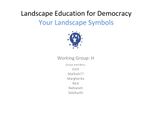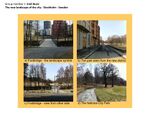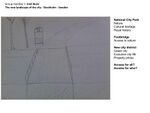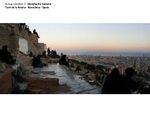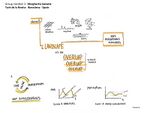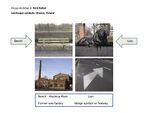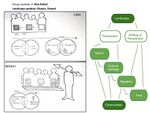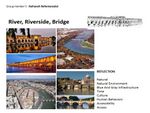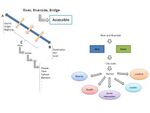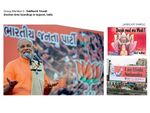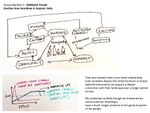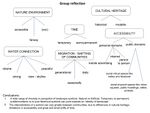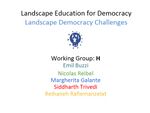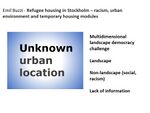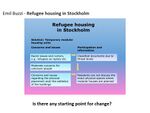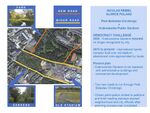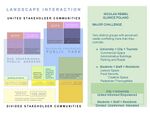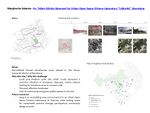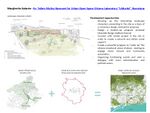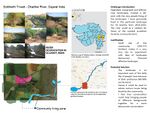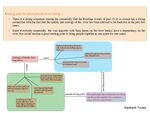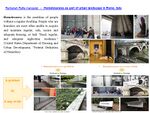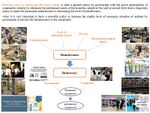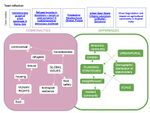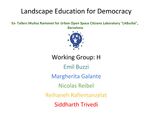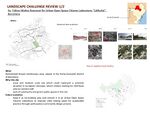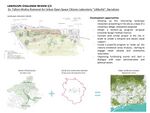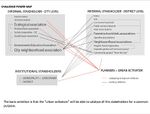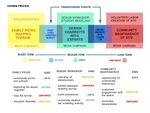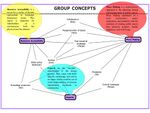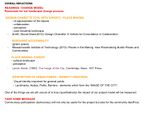LED Online Seminar 2016 - Working Group H
--> Back to working group overview
Dear working group members. This is your group page and you will be completing the template gradually as we move through the seminar. Good luck and enjoy your collaboration!
Assignment 1 - Reading and Synthesizing Core Terminology
- You can read more details about this assignment here
- Readings are accessible via the resources page
Step 1 - Define your readings
- Please add your readings selection for the terminology exercise before 25th of April on the readings selection page.
Step 2 - Concept mapping of core terms
Step 3 - Reporting
- group flection on your concept mapping process
Three common areas stood out in the content of our assigned articles: Experst, Place Making and Resource Accessibility
Resource Accessibility is a nexus for a variety of themes represented in landscape democracy issues. This aspect is important for stakeholders, as it encompasses both the physical and the abstract. In the case of the abstract, access to expert knowledge is limited and controlled by the elite, as with the city surplus. Imbalances to both the physical and metaphysical can be addressed through policy formation, which guarantees access to all stakeholders, no matter the power dynamic of a community. In the case of tangible resources, municipal programs can activate urban activity in post-industrial landscapes, through the use of obsolete industrial spaces. Where community programs and policy fail, stakeholders will reappropriate space for habitation - through squats, and food security - through illegal grazing of animals and gardening/farming on federal lands.
Place Making is a multi-faceted approach to the planning, design and management of public spaces. Place Making capitalizes on a local community's assets, inspiration, and potential, with the intention of creating public spaces that promote people's health, happiness, and well being. Landscape plays an important role in the design process. The term encourages disciplines involved in designing the built environment to work together in pursuit of qualities that they each alone are unable to achieve.
Experts are the ‘outsider’ stakeholders in the design process. They come with field-specific knowledge and advice on topics which could be out of reach/understanding of primary stakeholders (residents or community). The data and information that experts are equipped with help to bring a wider vision, Geographers, landscape architects, planners and botanists would be essentially a part of this team. Their involvement in the earlier stages is very vital as it would help in steering the direction of conversation. But their involvement in the beginning can help in informing the primary stakeholders about aspects of the project. In the mid-way stage they could assist or show potential future scenarios considering if things went ahead in the said direction.
Assignment 2 - Your Landscape Symbols
- You can read more details about this assignment here
- There is an own page for this assignment, please click to find further details
- go to --> Landscape Symbols Reflection Group H
Presentation slides 'Your Landscape Symbols'
After the presentation on April 21 please save your PPT slides to jpgs, upload them and add them to this gallery:
0
Assignment 3 - Role Play on Landscape Democracy "movers and shakers"
- You can read more details about this assignment here
Assignment 4 - Your Landscape Democracy Challenge
- You can read more details about this assignment here
- Each group member will specify a landscape democracy challenge in his/her environment
Your Landscape Democracy Challenges
- Reihaneh Rafiemanzelat - Homelessness as part of urban landscape in Rome, Italy
- Nicolas Reibel - Polytechnic Neighborhood Gliwice, Poland
- Emil Buzzi - Refugee housing in Stockholm – racism or valid concerns? A multidimensional democracy challenge
- Margherita Galante - Ex- Tallers Muñoz Ramonet for Urban Open Space Citizens Laboratory "LABurbà", Barcelona
- Maliheh Shahghadami- Decreasing of Green Spaces in Mashhad, Iran
Presentation slides 'Your Landscape Democracy Challenges'
After the presentation on May 19 please save your PPT slides to jpgs, upload them and add them to this gallery:
Assignment 5 - Your Democratic Change Process
- You can read more details about this assignment here
- After documenting and reflecting on your challenges you will continue jointly with one of these challenges and design a democratic change process
Your Democratic Change Model
- Urban Open Space Citizens Laboratory "LABurbà"
- - Ex- Tallers Muñoz Ramonet for Urban Open Space Citizens Laboratory "LABurbà", Barcelona
Presentation slides 'Your Democractic Change Process'
After the presentation on June 16 please save your PPT slides to jpgs, upload them and add them to this gallery:
